#carmaking
Explore tagged Tumblr posts
Quote
Travel is costly yes, but it pays dividends too.
Aaron Lauritsen, 100 Days Drive: The Great North American Road Trip
#quotes#Aaron Lauritsen#100 Days Drive: The Great North American Road Trip#thepersonalwords#literature#life quotes#prose#lit#spilled ink#100-days-drive#100daysdrive#acceptance#accomplish#ambition#author#awakening#be-happy#be-proud#believe#bestseller#break-barriers#carmaker#chances#change#chase-dreams#cherish#compassion#competition#confidence#conquer
78 notes
·
View notes
Text
The Musk-Trump lovefest is based on Musk hoping a Trump administration would reduce competition in the EV market.
"
On its face, a second Trump presidency would be bad for companies [like Tesla] trying to move the country away from fossil fuels.
Musk opened the company's investor call by saying the wave of competition killing its profits and shrinking its market share would pass, but he didn't offer any reasoning.
When asked if he was worried about Trump repealing the IRA, Musk tipped his hand. He told investors that the move would be "devastating" for Tesla's competitors but less so for Tesla — in fact, "long term," he said, it would be good for Tesla.
In essence this was an admission that Musk's best hope is that Trump returns to the White House and dismantles the regulatory regime that has encouraged legacy automakers to enter the EV market. The best thing for Tesla is if US legacy automakers like GM and Ford sit on the sidelines.
Rather than worrying about society's move to an all-electric future, Musk is mainly concerned about maintaining Tesla's dominant position in the EV market.
...
While he's hoping to use Trump to kill of competition in the EV market, Musk is talking up a world of fantastic innovations that Tesla STILL hasn't built yet.
First, he said that Telsa is not a car company; it is an AI company.
Then he promised autonomous robotaxis by August, never mind that Musk has been promising the robotaxi for about a decade.
Then he said the company was making headway with a new humanoid robot called Optimus — never mind that when Tesla unveiled Optimus it was a person dancing in a robot costume, and Tesla still won't say which tasks it can do.
Then he glazed over the product the world really wants: a cheaper Tesla priced at about $25,000 to $30,000. Without providing more detail, he mentioned that those models would start rolling out of factories in the first half of 2025, never mind that Musk has been saying something like that since 2018.
"
Pathetic.
#tesla#musk#elon musk#donald trump#trump#ev#electric vehicle#optimus#robotaxi#electric#green#automaker#carmaker#cars#automobile
5 notes
·
View notes
Text

Carmakers Will Give Your Location to Police Without a Warrant, Senators Say
#carmakers#location#police state#police#warrant#privacy#invasion of privacy#law#morals#ethics#class war#it#infotech#i.t.#information technology#fascism#capitalism#oppression#repression#ausgov#politas#auspol#tasgov#taspol#australia#fuck neoliberals#neoliberal capitalism#anthony albanese#albanese government#cars
5 notes
·
View notes
Text
Cars set to get expensive from January as OEMs announce price hikes
Prices of various car models — ranging from entry-level hatchbacks to high-end luxury offerings — are set to rise as automakers have announced price hikes with effect from January. Carmakers cite an increase in input costs and operational expenses as the main reason to implement price increases from the next month. Industry experts, however, note that the exercise is also undertaken by automakers…
0 notes
Photo

PRIMA PAGINA The Times di Oggi mercoledì, 27 novembre 2024
#PrimaPagina#thetimes quotidiano#giornale#primepagine#frontpage#nazionali#internazionali#news#inedicola#oggi newspaper#lets#dance#inside#times#hits#glasto#agrees#deal#since#which#days#carmaker#blames#plant#shuts#move#puts#jobs#threat#risk
1 note
·
View note
Text
Nissan investigates cyberattack in Australia and New Zealand
Japanese carmaker Nissan has reported a cybersecurity incident involving its systems in Australia and New Zealand. In a statement on Wednesday, the company said that it is working with security researchers “to investigate the extent of the incident and whether any personal information has been accessed.” Nissan has also notified the relevant security authorities in each country. The company…

View On WordPress
0 notes
Text
Iconic carmaker to launch first ever EV with new electric supercar factory already in the works | In Trend Today
Iconic carmaker to launch first ever EV with new electric supercar factory already in the works Read Full Text or Full Article on MAG NEWS
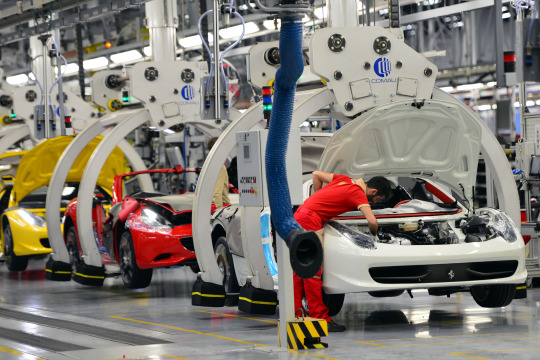
View On WordPress
#Celebrities#Iconic carmaker to launch first ever EV with new electric supercar factory already in the works#Money#Motors#Politics#ShowBiz#Sport#Tech#UK#US#World
0 notes
Text
Tesla CEO Elon Musk Signals Potential Further Price Cuts Amidst Challenging Market Conditions
[New Delhi]: Elon Musk, the CEO of Tesla, has caused a stir in the electric vehicle (EV) market by implying that additional price drops may be forthcoming in reaction to the unstable global economy and intense competition. Since the EV revolution began, Tesla has faced more competition, which has decreased its profit margins and caused a 4% dip in the company’s stock price in after-hours trading…
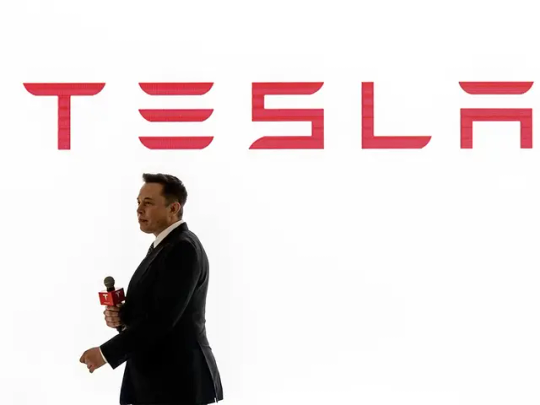
View On WordPress
#electric carmaker#Elon Musk#EV charging technology#price cuts#profit margins#record deliveries.#Tesla#tough competition#turbulent times#Wall Street analysts
0 notes
Text
Lithium Scarcity Pushes Carmakers Into the Mining Business
Not wanting to fall further behind Tesla and Chinese automakers, many Western auto executives are bypassing traditional suppliers and spending billions in deals with lithium miners. there is Wearing helmets and steel-toed boots, they explore mines in Chile, Argentina, Quebec, Nevada and beyond, securing supplies of vital metals for companies as they transition from gasoline to batteries. Without…

View On WordPress
0 notes
Text
If Lucid is found guilty the union the workers were attempting to form becomes automatically recognized under NLRB rules that are FINALLY being enforced again under the Biden administration.
So, Lucid... you should've known better.
The Phoenix-based regional director of the National Labor Relations Board is accusing a Casa Grande maker of electric luxury sports cars of anti-union activities.
A spokesperson for Lucid USA says they are confident that there is no factual basis for the complaint.
The U.S. labor agency is accusing Lucid Motors of illegally firing or transferring workers because they joined or helped a union and to dissuade other employees from exercising their rights. Other accusations include that Lucid confiscated union literature, created an impression of surveillance and threatened employees.
A Lucid spokesperson said in a statement that the company respects employees’ federal rights to choose whether or not to organize.
The sides are due to appear before an administrative law judge in early October unless there is a settlement.
#arizona#carmaker#lucid motors#national labor relations board#penalty for union busting is union recognition
42 notes
·
View notes
Text
"For the first time in almost 60 years, a state has formally overturned a so-called “right to work” law, clearing the way for workers to organize new union locals, collectively bargain, and make their voices heard at election time.
This week, Michigan finalized the process of eliminating a decade-old “right to work” law, which began with the shift in control of the state legislature from anti-union Republicans to pro-union Democrats following the 2022 election. “This moment has been decades in the making,” declared Michigan AFL-CIO President Ron Bieber. “By standing up and taking their power back, at the ballot box and in the workplace, workers have made it clear Michigan is and always will be the beating heart of the modern American labor movement.”
[Note: The article doesn't actually explain it, so anyway, "right to work" laws are powerful and deceptively named pieces of anti-union legislation. What right to work laws do is ban "union shops," or companies where every worker that benefits from a union is required to pay dues to the union. Right-to-work laws really undermine the leverage and especially the funding of unions, by letting non-union members receive most of the benefits of a union without helping sustain them. Sources: x, x, x, x]
In addition to formally scrapping the anti-labor law on Tuesday [February 13, 2024], Michigan also restored prevailing-wage protections for construction workers, expanded collective bargaining rights for public school employees, and restored organizing rights for graduate student research assistants at the state’s public colleges and universities. But even amid all of these wins for labor, it was the overturning of the “right to work” law that caught the attention of unions nationwide...
Now, the tide has begun to turn—beginning in a state with a rich labor history. And that’s got the attention of union activists and working-class people nationwide...
At a time when the labor movement is showing renewed vigor—and notching a string of high-profile victories, including last year’s successful strike by the United Auto Workers union against the Big Three carmakers, the historic UPS contract victory by the Teamsters, the SAG-AFTRA strike win in a struggle over abuses of AI technology in particular and the future of work in general, and the explosion of grassroots union organizing at workplaces across the country—the overturning of Michigan’s “right to work” law and the implementation of a sweeping pro-union agenda provides tangible evidence of how much has changed in recent years for workers and their unions...
By the mid-2010s, 27 states had “right to work” laws on the books.
But then, as a new generation of workers embraced “Fight for 15” organizing to raise wages, and campaigns to sign up workers at Starbucks and Amazon began to take off, the corporate-sponsored crusade to enact “right to work” measures stalled. New Hampshire’s legislature blocked a proposed “right to work” law in 2017 (and again in 2021), despite the fact that the measure was promoted by Republican Governor Chris Sununu. And in 2018, Missouri voters rejected a “right to work” referendum by a 67-33 margin.
Preventing anti-union legislation from being enacted and implemented is one thing, however. Actually overturning an existing law is something else altogether.
But that’s what happened in Michigan after 2022 voting saw the reelection of Governor Gretchen Whitmer, a labor ally, and—thanks to the overturning of gerrymandered legislative district maps that had favored the GOP—the election of Democratic majorities in the state House and state Senate. For the first time in four decades, the Democrats controlled all the major levers of power in Michigan, and they used them to implement a sweeping pro-labor agenda. That was a significant shift for Michigan, to be sure. But it was also an indication of what could be done in other states across the Great Lakes region, and nationwide.
“Michigan Democrats took full control of the state government for the first time in 40 years. They used that power to repeal the state’s ‘right to work’ law,” explained a delighted former US secretary of labor Robert Reich, who added, “This is why we have to show up for our state and local elections.”"
-via The Nation, February 16, 2024
#michigan#united states#us politics#labor#labor rights#labor unions#capitalism#unions#unionize#gretchen whitmer#democrats#voting matters#right to work#pro union#workers#workers rights#good news#hope
1K notes
·
View notes
Text
Your car spies on you and rats you out to insurance companies

I'm on tour with my new, nationally bestselling novel The Bezzle! Catch me TOMORROW (Mar 13) in SAN FRANCISCO with ROBIN SLOAN, then Toronto, NYC, Anaheim, and more!

Another characteristically brilliant Kashmir Hill story for The New York Times reveals another characteristically terrible fact about modern life: your car secretly records fine-grained telemetry about your driving and sells it to data-brokers, who sell it to insurers, who use it as a pretext to gouge you on premiums:
https://www.nytimes.com/2024/03/11/technology/carmakers-driver-tracking-insurance.html
Almost every car manufacturer does this: Hyundai, Nissan, Ford, Chrysler, etc etc:
https://www.repairerdrivennews.com/2020/09/09/ford-state-farm-ford-metromile-honda-verisk-among-insurer-oem-telematics-connections/
This is true whether you own or lease the car, and it's separate from the "black box" your insurer might have offered to you in exchange for a discount on your premiums. In other words, even if you say no to the insurer's carrot – a surveillance-based discount – they've got a stick in reserve: buying your nonconsensually harvested data on the open market.
I've always hated that saying, "If you're not paying for the product, you're the product," the reason being that it posits decent treatment as a customer reward program, like the little ramekin warm nuts first class passengers get before takeoff. Companies don't treat you well when you pay them. Companies treat you well when they fear the consequences of treating you badly.
Take Apple. The company offers Ios users a one-tap opt-out from commercial surveillance, and more than 96% of users opted out. Presumably, the other 4% were either confused or on Facebook's payroll. Apple – and its army of cultists – insist that this proves that our world's woes can be traced to cheapskate "consumers" who expected to get something for nothing by using advertising-supported products.
But here's the kicker: right after Apple blocked all its rivals from spying on its customers, it began secretly spying on those customers! Apple has a rival surveillance ad network, and even if you opt out of commercial surveillance on your Iphone, Apple still secretly spies on you and uses the data to target you for ads:
https://pluralistic.net/2022/11/14/luxury-surveillance/#liar-liar
Even if you're paying for the product, you're still the product – provided the company can get away with treating you as the product. Apple can absolutely get away with treating you as the product, because it lacks the historical constraints that prevented Apple – and other companies – from treating you as the product.
As I described in my McLuhan lecture on enshittification, tech firms can be constrained by four forces:
I. Competition
II. Regulation
III. Self-help
IV. Labor
https://pluralistic.net/2024/01/30/go-nuts-meine-kerle/#ich-bin-ein-bratapfel
When companies have real competitors – when a sector is composed of dozens or hundreds of roughly evenly matched firms – they have to worry that a maltreated customer might move to a rival. 40 years of antitrust neglect means that corporations were able to buy their way to dominance with predatory mergers and pricing, producing today's inbred, Habsburg capitalism. Apple and Google are a mobile duopoly, Google is a search monopoly, etc. It's not just tech! Every sector looks like this:
https://www.openmarketsinstitute.org/learn/monopoly-by-the-numbers
Eliminating competition doesn't just deprive customers of alternatives, it also empowers corporations. Liberated from "wasteful competition," companies in concentrated industries can extract massive profits. Think of how both Apple and Google have "competitively" arrived at the same 30% app tax on app sales and transactions, a rate that's more than 1,000% higher than the transaction fees extracted by the (bloated, price-gouging) credit-card sector:
https://pluralistic.net/2023/06/07/curatorial-vig/#app-tax
But cartels' power goes beyond the size of their warchest. The real source of a cartel's power is the ease with which a small number of companies can arrive at – and stick to – a common lobbying position. That's where "regulatory capture" comes in: the mobile duopoly has an easier time of capturing its regulators because two companies have an easy time agreeing on how to spend their app-tax billions:
https://pluralistic.net/2022/06/05/regulatory-capture/
Apple – and Google, and Facebook, and your car company – can violate your privacy because they aren't constrained regulation, just as Uber can violate its drivers' labor rights and Amazon can violate your consumer rights. The tech cartels have captured their regulators and convinced them that the law doesn't apply if it's being broken via an app:
https://pluralistic.net/2023/04/18/cursed-are-the-sausagemakers/#how-the-parties-get-to-yes
In other words, Apple can spy on you because it's allowed to spy on you. America's last consumer privacy law was passed in 1988, and it bans video-store clerks from leaking your VHS rental history. Congress has taken no action on consumer privacy since the Reagan years:
https://www.eff.org/tags/video-privacy-protection-act
But tech has some special enshittification-resistant characteristics. The most important of these is interoperability: the fact that computers are universal digital machines that can run any program. HP can design a printer that rejects third-party ink and charge $10,000/gallon for its own colored water, but someone else can write a program that lets you jailbreak your printer so that it accepts any ink cartridge:
https://www.eff.org/deeplinks/2020/11/ink-stained-wretches-battle-soul-digital-freedom-taking-place-inside-your-printer
Tech companies that contemplated enshittifying their products always had to watch over their shoulders for a rival that might offer a disenshittification tool and use that as a wedge between the company and its customers. If you make your website's ads 20% more obnoxious in anticipation of a 2% increase in gross margins, you have to consider the possibility that 40% of your users will google "how do I block ads?" Because the revenue from a user who blocks ads doesn't stay at 100% of the current levels – it drops to zero, forever (no user ever googles "how do I stop blocking ads?").
The majority of web users are running an ad-blocker:
https://doc.searls.com/2023/11/11/how-is-the-worlds-biggest-boycott-doing/
Web operators made them an offer ("free website in exchange for unlimited surveillance and unfettered intrusions") and they made a counteroffer ("how about 'nah'?"):
https://www.eff.org/deeplinks/2019/07/adblocking-how-about-nah
Here's the thing: reverse-engineering an app – or any other IP-encumbered technology – is a legal minefield. Just decompiling an app exposes you to felony prosecution: a five year sentence and a $500k fine for violating Section 1201 of the DMCA. But it's not just the DMCA – modern products are surrounded with high-tech tripwires that allow companies to invoke IP law to prevent competitors from augmenting, recongifuring or adapting their products. When a business says it has "IP," it means that it has arranged its legal affairs to allow it to invoke the power of the state to control its customers, critics and competitors:
https://locusmag.com/2020/09/cory-doctorow-ip/
An "app" is just a web-page skinned in enough IP to make it a crime to add an ad-blocker to it. This is what Jay Freeman calls "felony contempt of business model" and it's everywhere. When companies don't have to worry about users deploying self-help measures to disenshittify their products, they are freed from the constraint that prevents them indulging the impulse to shift value from their customers to themselves.
Apple owes its existence to interoperability – its ability to clone Microsoft Office's file formats for Pages, Numbers and Keynote, which saved the company in the early 2000s – and ever since, it has devoted its existence to making sure no one ever does to Apple what Apple did to Microsoft:
https://www.eff.org/deeplinks/2019/06/adversarial-interoperability-reviving-elegant-weapon-more-civilized-age-slay
Regulatory capture cuts both ways: it's not just about powerful corporations being free to flout the law, it's also about their ability to enlist the law to punish competitors that might constrain their plans for exploiting their workers, customers, suppliers or other stakeholders.
The final historical constraint on tech companies was their own workers. Tech has very low union-density, but that's in part because individual tech workers enjoyed so much bargaining power due to their scarcity. This is why their bosses pampered them with whimsical campuses filled with gourmet cafeterias, fancy gyms and free massages: it allowed tech companies to convince tech workers to work like government mules by flattering them that they were partners on a mission to bring the world to its digital future:
https://pluralistic.net/2023/09/10/the-proletarianization-of-tech-workers/
For tech bosses, this gambit worked well, but failed badly. On the one hand, they were able to get otherwise powerful workers to consent to being "extremely hardcore" by invoking Fobazi Ettarh's spirit of "vocational awe":
https://www.inthelibrarywiththeleadpipe.org/2018/vocational-awe/
On the other hand, when you motivate your workers by appealing to their sense of mission, the downside is that they feel a sense of mission. That means that when you demand that a tech worker enshittifies something they missed their mother's funeral to deliver, they will experience a profound sense of moral injury and refuse, and that worker's bargaining power means that they can make it stick.
Or at least, it did. In this era of mass tech layoffs, when Google can fire 12,000 workers after a $80b stock buyback that would have paid their wages for the next 27 years, tech workers are learning that the answer to "I won't do this and you can't make me" is "don't let the door hit you in the ass on the way out" (AKA "sharpen your blades boys"):
https://techcrunch.com/2022/09/29/elon-musk-texts-discovery-twitter/
With competition, regulation, self-help and labor cleared away, tech firms – and firms that have wrapped their products around the pluripotently malleable core of digital tech, including automotive makers – are no longer constrained from enshittifying their products.
And that's why your car manufacturer has chosen to spy on you and sell your private information to data-brokers and anyone else who wants it. Not because you didn't pay for the product, so you're the product. It's because they can get away with it.
Cars are enshittified. The dozens of chips that auto makers have shoveled into their car design are only incidentally related to delivering a better product. The primary use for those chips is autoenshittification – access to legal strictures ("IP") that allows them to block modifications and repairs that would interfere with the unfettered abuse of their own customers:
https://pluralistic.net/2023/07/24/rent-to-pwn/#kitt-is-a-demon
The fact that it's a felony to reverse-engineer and modify a car's software opens the floodgates to all kinds of shitty scams. Remember when Bay Staters were voting on a ballot measure to impose right-to-repair obligations on automakers in Massachusetts? The only reason they needed to have the law intervene to make right-to-repair viable is that Big Car has figured out that if it encrypts its diagnostic messages, it can felonize third-party diagnosis of a car, because decrypting the messages violates the DMCA:
https://www.eff.org/deeplinks/2013/11/drm-cars-will-drive-consumers-crazy
Big Car figured out that VIN locking – DRM for engine components and subassemblies – can felonize the production and the installation of third-party spare parts:
https://pluralistic.net/2022/05/08/about-those-kill-switched-ukrainian-tractors/
The fact that you can't legally modify your car means that automakers can go back to their pre-2008 ways, when they transformed themselves into unregulated banks that incidentally manufactured the cars they sold subprime loans for. Subprime auto loans – over $1t worth! – absolutely relies on the fact that borrowers' cars can be remotely controlled by lenders. Miss a payment and your car's stereo turns itself on and blares threatening messages at top volume, which you can't turn off. Break the lease agreement that says you won't drive your car over the county line and it will immobilize itself. Try to change any of this software and you'll commit a felony under Section 1201 of the DMCA:
https://pluralistic.net/2021/04/02/innovation-unlocks-markets/#digital-arm-breakers
Tesla, naturally, has the most advanced anti-features. Long before BMW tried to rent you your seat-heater and Mercedes tried to sell you a monthly subscription to your accelerator pedal, Teslas were demon-haunted nightmare cars. Miss a Tesla payment and the car will immobilize itself and lock you out until the repo man arrives, then it will blare its horn and back itself out of its parking spot. If you "buy" the right to fully charge your car's battery or use the features it came with, you don't own them – they're repossessed when your car changes hands, meaning you get less money on the used market because your car's next owner has to buy these features all over again:
https://pluralistic.net/2023/07/28/edison-not-tesla/#demon-haunted-world
And all this DRM allows your car maker to install spyware that you're not allowed to remove. They really tipped their hand on this when the R2R ballot measure was steaming towards an 80% victory, with wall-to-wall scare ads that revealed that your car collects so much information about you that allowing third parties to access it could lead to your murder (no, really!):
https://pluralistic.net/2020/09/03/rip-david-graeber/#rolling-surveillance-platforms
That's why your car spies on you. Because it can. Because the company that made it lacks constraint, be it market-based, legal, technological or its own workforce's ethics.
One common critique of my enshittification hypothesis is that this is "kind of sensible and normal" because "there’s something off in the consumer mindset that we’ve come to believe that the internet should provide us with amazing products, which bring us joy and happiness and we spend hours of the day on, and should ask nothing back in return":
https://freakonomics.com/podcast/how-to-have-great-conversations/
What this criticism misses is that this isn't the companies bargaining to shift some value from us to them. Enshittification happens when a company can seize all that value, without having to bargain, exploiting law and technology and market power over buyers and sellers to unilaterally alter the way the products and services we rely on work.
A company that doesn't have to fear competitors, regulators, jailbreaking or workers' refusal to enshittify its products doesn't have to bargain, it can take. It's the first lesson they teach you in the Darth Vader MBA: "I am altering the deal. Pray I don't alter it any further":
https://pluralistic.net/2023/10/26/hit-with-a-brick/#graceful-failure
Your car spying on you isn't down to your belief that your carmaker "should provide you with amazing products, which brings your joy and happiness you spend hours of the day on, and should ask nothing back in return." It's not because you didn't pay for the product, so now you're the product. It's because they can get away with it.
The consequences of this spying go much further than mere insurance premium hikes, too. Car telemetry sits at the top of the funnel that the unbelievably sleazy data broker industry uses to collect and sell our data. These are the same companies that sell the fact that you visited an abortion clinic to marketers, bounty hunters, advertisers, or vengeful family members pretending to be one of those:
https://pluralistic.net/2022/05/07/safegraph-spies-and-lies/#theres-no-i-in-uterus
Decades of pro-monopoly policy led to widespread regulatory capture. Corporate cartels use the monopoly profits they extract from us to pay for regulatory inaction, allowing them to extract more profits.
But when it comes to privacy, that period of unchecked corporate power might be coming to an end. The lack of privacy regulation is at the root of so many problems that a pro-privacy movement has an unstoppable constituency working in its favor.
At EFF, we call this "privacy first." Whether you're worried about grifters targeting vulnerable people with conspiracy theories, or teens being targeted with media that harms their mental health, or Americans being spied on by foreign governments, or cops using commercial surveillance data to round up protesters, or your car selling your data to insurance companies, passing that long-overdue privacy legislation would turn off the taps for the data powering all these harms:
https://www.eff.org/wp/privacy-first-better-way-address-online-harms
Traditional economics fails because it thinks about markets without thinking about power. Monopolies lead to more than market power: they produce regulatory capture, power over workers, and state capture, which felonizes competition through IP law. The story that our problems stem from the fact that we just don't spend enough money, or buy the wrong products, only makes sense if you willfully ignore the power that corporations exert over our lives. It's nice to think that you can shop your way out of a monopoly, because that's a lot easier than voting your way out of a monopoly, but no matter how many times you vote with your wallet, the cartels that control the market will always win:
https://pluralistic.net/2024/03/05/the-map-is-not-the-territory/#apor-locksmith

Name your price for 18 of my DRM-free ebooks and support the Electronic Frontier Foundation with the Humble Cory Doctorow Bundle.

If you'd like an essay-formatted version of this post to read or share, here's a link to it on pluralistic.net, my surveillance-free, ad-free, tracker-free blog:
https://pluralistic.net/2024/03/12/market-failure/#car-wars

Image: Cryteria (modified) https://commons.wikimedia.org/wiki/File:HAL9000.svg
CC BY 3.0 https://creativecommons.org/licenses/by/3.0/deed.en
#pluralistic#if you're not paying for the product you're the product#if you're paying for the product you're the product#cars#automotive#enshittification#technofeudalism#autoenshittification#antifeatures#felony contempt of business model#twiddling#right to repair#privacywashing#apple#lexisnexis#insuretech#surveillance#commercial surveillance#privacy first#data brokers#subprime#kash hill#kashmir hill
2K notes
·
View notes
Text
Costco workers in Norfolk, Va. have voted to join the Teamsters Local 822, with the union calling this its first organizing victory at the wholesale retailer in two decades. The 238-worker group will join more than 18,000 Teamsters at Costco nationwide. Successful unionization efforts in the retail industry have been relatively rare, but they may pick up steam this year following a strong year for labor in 2023, with successful strikes by the United Auto Workers against the Big Three carmakers and by SAG-AFTRA and the Writers Guild of America against Hollywood studios.
#news#virginia#virginia news#us news#uspol#us pol#teamsters#teamsters union#costco union#costco#union strong#unionize#unions work
882 notes
·
View notes
Text
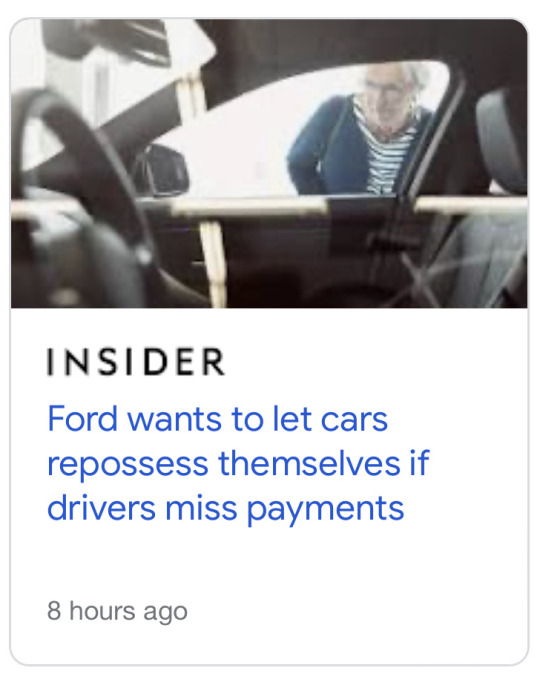
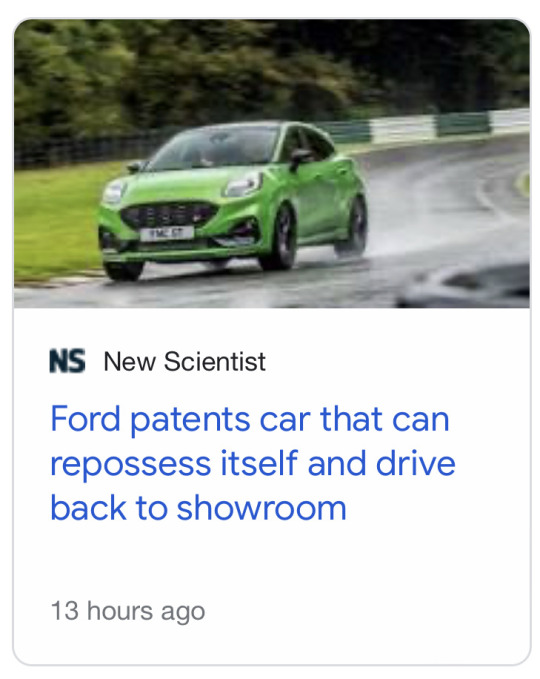
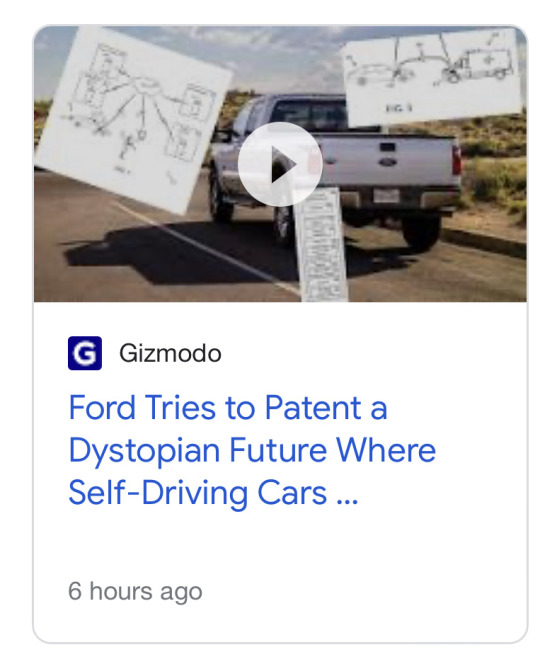




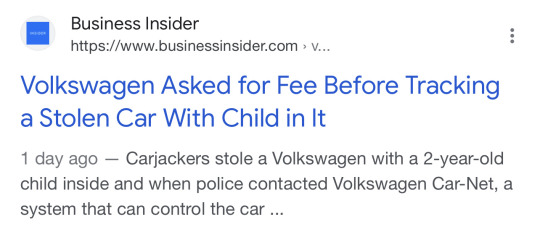
“Smart Cars” + Capitalism = a very dystopian future
Ford’s patent ranges from having a “self driving” car return itself to the dealership if you miss a payment, to having the car abruptly disable itself, to “minor inconveniences” like having the air conditioner or heater stop working until you voluntarily return the car.
Don’t think for one second that all carmakers aren’t thinking about doing the same things. Especially Tesla Motors.
Carmakers are already trying to monetize even the most basic features, like charging monthly fees for the ability to use your car’s seat warmers.
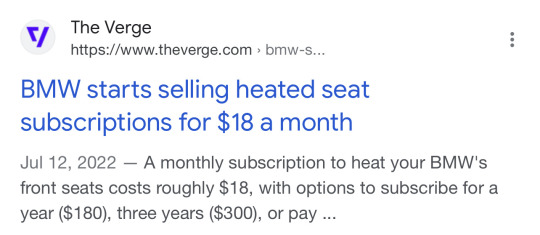
Anyway, nobody does more to radicalize people against capitalism more than greedy capitalists.
#fsd#self driving cars#smart cars#ford#volkswagen#capitalism#corporate greed#greed#tesla#ford motor co#spyware#geolocation data#geolocation tracking
4K notes
·
View notes
Text
I wonder what the next carbody trend will be? Aside from adding like 30 goddamn angles to every fender.
crossovers used to be cool until they became so predominate and now it’s just like the fortnitetification of media. yay
24 notes
·
View notes